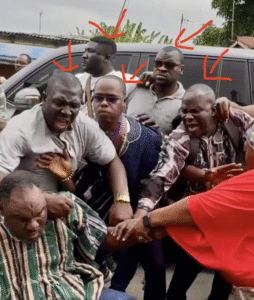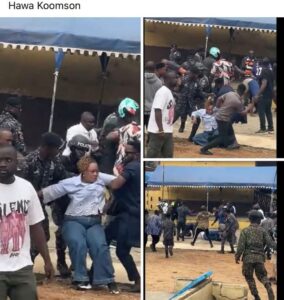The recent parliamentary election reruns in Ayawaso West Wuogon and Ablekuma North have been marred by significant violence, raising serious concerns about the state of Ghana’s democratic process. These incidents have not only highlighted the urgent need for electoral reforms but also underscored the importance of ensuring peaceful and fair elections in the future.
The violence witnessed during these elections has left a lasting impact on the electorate and the political landscape of Ghana. In Ayawaso West Wuogon, the election was characterized by clashes between supporters of opposing parties, leading to injuries and widespread fear among voters. Similarly, the Ablekuma North election rerun saw brutal attacks on political figures and journalists, further exacerbating tensions and undermining the credibility of the electoral process.
These violent episodes serve as a stark reminder that the integrity of elections is paramount to the health of any democracy. The lessons learned from Ayawaso West Wuogon and Ablekuma North must be taken seriously to prevent similar occurrences in future elections, including any upcoming by-elections and the highly anticipated 2028 general elections.
One of the key takeaways from these incidents is the need for robust security measures to protect voters, candidates, and journalists. The Ghana Police Service must be adequately equipped and trained to handle electoral violence and ensure that law and order are maintained throughout the electoral process. Additionally, there must be a zero-tolerance policy towards any form of intimidation or violence, with swift and decisive action taken against perpetrators.
Another critical lesson is the importance of transparency and accountability in the electoral process. The Electoral Commission of Ghana must work diligently to ensure that all aspects of the election are conducted fairly and transparently. This includes addressing any allegations of misconduct and ensuring that the results reflect the true will of the people.
The role of political parties in promoting peaceful elections cannot be overstated. Party leaders must take responsibility for the actions of their supporters and actively discourage any form of violence or intimidation. Political parties must also engage in constructive dialogue and work together to uphold the principles of democracy.
As Ghana looks ahead to the 2028 general elections, it is crucial to implement the lessons learned from Ayawaso West Wuogon and Ablekuma North. The credibility of the electoral process and the trust of the electorate depend on the ability to conduct free, fair, and peaceful elections. The future of Ghana’s democracy hinges on the commitment of all stakeholders to uphold these values and work towards a more just and equitable society.
In conclusion, the violence witnessed in Ayawaso West Wuogon and Ablekuma North serves as a wake-up call for Ghana. It is a reminder that the path to a strong and vibrant democracy requires vigilance, accountability, and a collective commitment to peace. As the nation prepares for future elections, let us learn from the past and strive to build a democratic process that truly reflects the will of the people.

